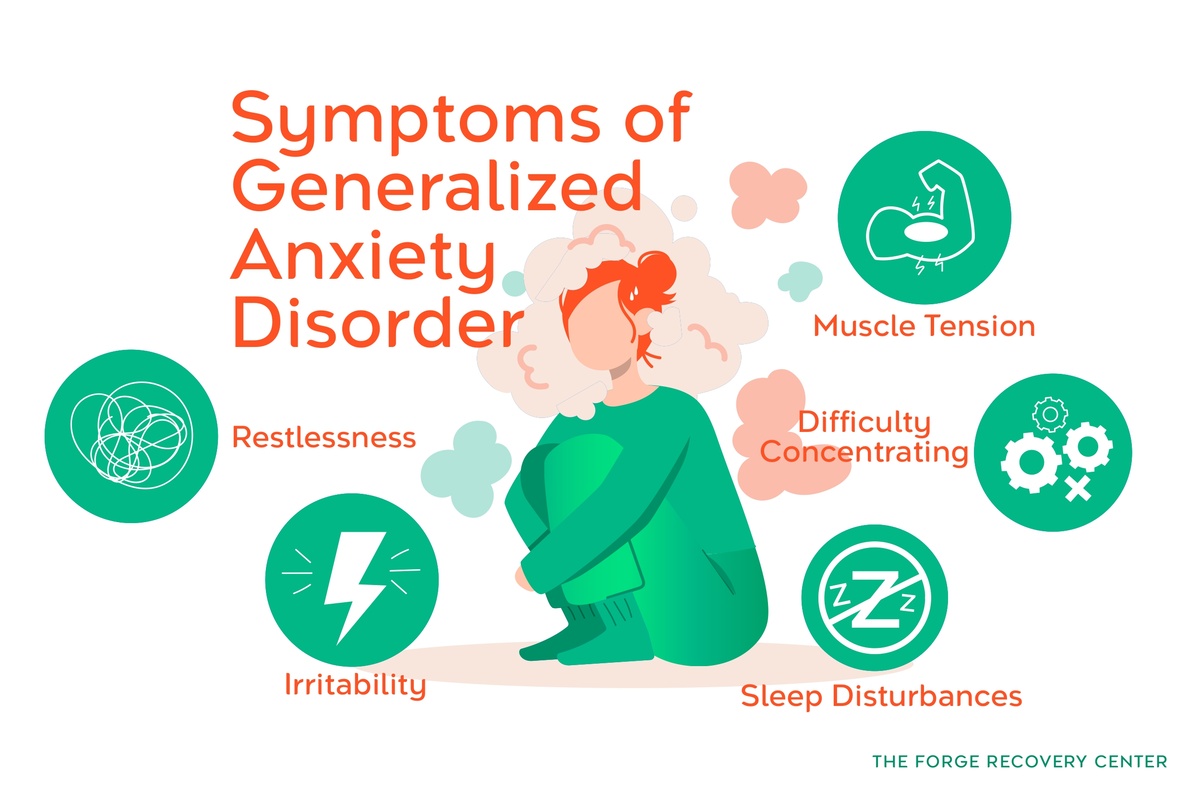Generalized Anxiety Disorder: Symptoms, Causes, & Treatment Options


Generalized anxiety disorder (GAD) intrudes your mind with feelings of worry and unease, making even everyday tasks seem like stark challenges. But it doesn’t have to control you, and treatment is available in the form of therapy, medication, and healthy lifestyle changes. Learn more about the symptoms and treatment options for GAD, and call The Forge Recovery Center if you need an ally on your path to mental well-being.
What Is Generalized Anxiety Disorder?
Generalized anxiety disorder is a mental health condition characterized by excessive and uncontrollable worry about various aspects of life. Individuals with GAD often experience persistent anxiety and fear that interferes with their daily functioning. This disorder can lead to physical symptoms such as restlessness, irritability, muscle tension, and difficulty concentrating.

Generalized Anxiety Disorder Symptoms
GAD typically manifests differently in adults than in children and teens, and it’s important to understand the differences in symptoms. Here’s an overview of common adult- and child-specific GAD symptoms:
Adults
Adults with generalized anxiety disorder may experience symptoms such as excessive worry about everyday life events, trouble controlling their worries, restlessness, irritability, muscle tension, difficulty concentrating, and sleep disturbances. These symptoms can significantly impact daily functioning and quality of life for adults with this condition. It is essential for individuals experiencing these symptoms to seek help from a mental health professional for proper diagnosis and treatment.
Children & Teens
In children and teenagers, signs of generalized anxiety disorder may manifest differently compared to adults. Young individuals with GAD may exhibit symptoms such as restlessness, irritability, difficulty concentrating, and physical complaints like stomach aches or headaches. Long-term effects of GAD on children and teens can include academic struggles, social difficulties, and an increased risk of developing other mental health conditions later in life if left untreated. Early intervention plays a vital role in preventing these negative outcomes.
Early identification and intervention for generalized anxiety disorder in children and teens are crucial for promoting healthy emotional development and preventing long-term consequences. Providing a supportive environment, teaching coping skills, and seeking professional help when needed can significantly benefit young individuals struggling with anxiety.

Are You Struggling with Mental Health or Addiction?
We Can Help. Call Us Now!
CALL: 877-839-1772
GAD Treatment Options
Generalized anxiety disorder is primarily treated with a combination of therapy, such as cognitive-behavioral therapy or mindfulness-based stress reduction, and certain medications. Lifestyle changes like exercising regularly and eating a balanced diet can also help people with GAD mitigate symptoms. Here’s an overview of treatment options, which can be administered by a mental health professional or at a mental health and addiction treatment center:
Therapy
CBT
Cognitive-behavioral therapy (CBT) is highly effective in treating GAD. You can benefit from CBT by learning to change negative thought patterns. The practical techniques used in CBT help you manage GAD symptoms effectively.
MBSR
Mindfulness-based stress reduction (MBSR) offers numerous benefits for individuals with GAD. By practicing MBSR techniques, you can learn to cope with anxiety and improve overall well-being. Mindfulness plays a crucial role in reducing GAD symptoms and enhancing mental health.
Medications
SSRIs
Selective Serotonin Reuptake Inhibitors (SSRIs) are commonly prescribed for GAD treatment. You can rely on SSRIs to alleviate anxiety symptoms effectively. However, it's essential to be aware of potential side effects and considerations when using SSRIs for managing generalized anxiety disorder.
Benzodiazepines
Benzodiazepines are useful for managing acute anxiety symptoms in individuals with GAD. While they provide quick relief, you must understand the risks and benefits associated with their use. It's crucial to follow precautions and consider alternatives when using Benzodiazepines for GAD treatment.
Lifestyle Changes
Regular Exercise
Engaging in regular exercise has a positive impact on managing symptoms of generalized anxiety disorder. Physical activity helps reduce stress and anxiety levels significantly. By incorporating recommended types and durations of exercise into your routine, you can effectively manage GAD symptoms.
Balanced Diet
Maintaining a balanced diet is crucial for supporting mental health in individuals with GAD. Certain nutrients play a vital role in alleviating anxiety symptoms. Understanding the connection between diet, gut health, and GAD management empowers you to make informed dietary choices.
Adequate Sleep
Adequate sleep is essential for effectively managing GAD symptoms. Sleep deprivation can exacerbate anxiety levels, impacting overall well-being. Implementing practical tips to improve sleep quality enhances your ability to cope with anxiety and maintain mental health.
What Causes GAD?
The causes of generalized anxiety disorder are multifaceted, spread across your genetic predisposition to the disorder, environmental triggers, and certain lifestyle factors such as excessive caffeine consumption or a lack of sleep. Let’s explore these causes further:
Genetic Predisposition
Genetics plays a crucial role in predisposing individuals to generalized anxiety disorder. You inherit certain genes that can increase your vulnerability to developing GAD. These genetic factors interact with environmental influences to shape your risk of experiencing anxiety.
Some people may have specific gene variations that make them more prone to anxiety disorders like GAD. These genetic variations can impact how your brain regulates stress and fear responses, potentially leading to heightened anxiety levels. Understanding the genetic components of GAD can help tailor treatment approaches for better outcomes.
Environmental Triggers
Various environmental triggers can worsen symptoms of GAD, making it essential to identify and address them. Stressful life events, such as job loss or relationship problems, can significantly exacerbate anxiety symptoms in individuals with GAD. exposure to traumatic experiences or chronic stressors can contribute to the development and persistence of GAD.
Your living environment, work conditions, and social interactions all play a role in influencing your anxiety levels. High-pressure work environments, constant exposure to noise pollution, or living in chaotic surroundings can all contribute to heightened anxiety. By recognizing these triggers, you can take steps to reduce their impact on your mental well-being.
Lifestyle Factors
Your lifestyle choices have a direct impact on the severity of GAD symptoms you experience. Daily habits like excessive caffeine consumption or irregular sleep patterns can exacerbate feelings of anxiety. Engaging in regular physical activity, practicing relaxation techniques like deep breathing or meditation, and maintaining a balanced diet are all beneficial for managing GAD symptoms.
Making positive changes in your lifestyle can significantly improve your overall well-being and reduce the intensity of anxiety symptoms. Prioritizing self-care activities, setting boundaries to manage stress effectively, and seeking social support are crucial steps in creating a conducive environment for managing GAD. By incorporating these changes into your daily routine, you can enhance your resilience against anxiety triggers.

Are You Struggling with Mental Health or Addiction?
We Can Help. Call Us Now!
CALL: 877-839-1772
Effects of GAD
The effects of generalized anxiety disorder on your mind and body can result in significant disruptions to your daily life, from relationship issues to lacking work performance. Let’s examine how these effects unfold:
Mental Health
Untreated generalized anxiety disorder (GAD) can lead to a range of mental health issues. You may experience persistent worry, fear, and excessive stress, affecting your daily life. This can result in difficulty concentrating, irritability, and insomnia.
Chronic anxiety from GAD can escalate to more severe conditions like depression and panic disorders. Your mental well-being may deteriorate, impacting your ability to cope with everyday challenges and enjoy life fully.
Physical Health
The effects of generalized anxiety disorder are not limited to mental health; they can also manifest physically. Your body's response to constant anxiety can include muscle tension, headaches, and gastrointestinal problems. These physical symptoms can exacerbate the emotional distress caused by GAD.
Over time, untreated GAD may increase the risk of developing chronic conditions such as heart disease and hypertension. You might notice changes in appetite, weight fluctuations, and a weakened immune system due to the ongoing stress associated with this disorder.
Relationships and Work Performance
Generalized anxiety disorder can significantly impact your relationships with others. The constant worry and apprehension may strain interactions with family, friends, and colleagues. Misunderstandings or conflicts arising from anxiety symptoms can lead to social isolation and feelings of loneliness.
At work, the effects of GAD on your performance can be profound. Difficulty focusing, making decisions, or meeting deadlines due to excessive worrying can hinder your productivity and career advancement. This may result in increased absenteeism at work due to the challenges posed by untreated GAD.
Long-Term Consequences
The long-term effects of chronic anxiety associated with GAD are concerning. Prolonged exposure to high levels of stress hormones like cortisol can have detrimental effects on various bodily systems over time. This includes an increased risk of cardiovascular diseases, digestive issues, and compromised immune function.
Moreover, individuals with untreated generalized anxiety disorder may struggle with self-esteem issues, reduced quality of life, and a sense of hopelessness about the future. Seeking timely intervention through therapy or medication is crucial in mitigating these long-term consequences and improving overall well-being.

Diagnosing Generalized Anxiety Disorder
Diagnosing generalized anxiety disorder involves a medical evaluation and psychological assessment that refers to the DSM-5’s criteria for GAD. Here’s how the diagnosis process works:
Medical Evaluation
When diagnosing generalized anxiety disorder (GAD), a thorough medical evaluation is crucial. You must understand that various physical conditions can mimic GAD symptoms. Healthcare providers conduct a comprehensive medical evaluation to rule out other potential causes.
Key assessments and tests play a significant role in evaluating GAD symptoms. These may include blood tests, thyroid function tests, and imaging studies such as MRI or CT scans. Such evaluations help in determining if the symptoms are primarily due to an underlying medical condition.
Healthcare providers, including primary care physicians and psychiatrists, are instrumental in conducting a comprehensive medical evaluation for GAD. They consider your medical history, current symptoms, and any family history of mental health issues to ensure an accurate diagnosis.
Psychological Assessment
In diagnosing GAD, psychological assessments are essential tools used by mental health professionals. These assessments help in understanding the severity of anxiety symptoms and their impact on your daily life. Tools like standardized questionnaires and interviews aid in assessing GAD.
Mental health professionals utilize various techniques to diagnose and assess GAD accurately. Cognitive-behavioral therapy (CBT) techniques may be employed to identify thought patterns contributing to anxiety. Observing behavioral patterns can provide valuable insights into the presence of GAD symptoms.
Different tools are employed in psychological assessments for GAD diagnosis. The Beck Anxiety Inventory and Hamilton Anxiety Rating Scale are commonly used questionnaires to measure the severity of anxiety symptoms. Through these assessments, mental health professionals gain a better understanding of your emotional state.
Are You Struggling with Mental Health or Addiction?
We Can Help. Call Us Now!
CALL: 877-839-1772
Living with GAD
As someone living with GAD, it’s important to know how to manage symptoms on a daily basis and keep control over the long term. Here are some tips and strategies for accomplishing this:
Daily Symptom Management
When living with GAD, you may find it helpful to implement practical strategies for managing daily symptoms. You can start by identifying triggers that exacerbate your anxiety and developing coping mechanisms to address them. Engaging in activities like deep breathing, meditation, or progressive muscle relaxation can provide immediate relief during moments of heightened anxiety. Consistency is key; establishing a routine that includes these techniques can help regulate your symptoms over time.
To effectively manage daily symptoms of GAD, you should prioritize self-care practices that promote mental well-being. This includes maintaining a healthy lifestyle through regular exercise, balanced nutrition, and sufficient sleep. Avoiding caffeine and alcohol can also help in reducing anxiety levels. Seeking support from loved ones or joining a support group can offer emotional reassurance and practical advice on symptom management.
Long-Term Strategies
When considering long-term strategies for managing GAD, it's important to explore various approaches that go beyond immediate symptom relief. Lifestyle changes such as incorporating regular physical activity into your routine can significantly reduce overall anxiety levels. Engaging in activities that bring joy and relaxation, such as hobbies or spending time in nature, can also contribute to long-term emotional well-being.
Therapies like cognitive-behavioral therapy (CBT) have shown effectiveness in treating GAD by helping individuals reframe negative thought patterns and develop healthier coping mechanisms. By working with a therapist trained in CBT, you can gain valuable tools to navigate anxious feelings and responses more effectively. It's essential to commit to the therapeutic process and practice the skills learned consistently for lasting benefits.
In adopting a holistic approach to managing GAD, you acknowledge the interconnectedness of physical, emotional, and mental well-being. Integrating mindfulness practices into your daily routine, such as yoga or journaling, can enhance self-awareness and promote inner calm. Remember that seeking professional guidance from mental health professionals is crucial in creating a comprehensive treatment plan tailored to your specific needs.
GAD Prevalence
Generalized anxiety disorder is one of the most common anxiety disorders worldwide, and impacts millions of Americans year by year. Below, we’ve gathered some recent statistics on GAD to give you an idea of its current prevalence:
Worldwide
Global statistics indicate that generalized anxiety disorder (GAD) is a prevalent mental health condition worldwide. According to the World Health Organization (WHO), GAD affects approximately 3.7% of the global population, making it one of the most common anxiety disorders.
Research also shows that GAD is more prevalent in women than in men, with women being twice as likely to be diagnosed with the disorder. These statistics highlight the significant impact of GAD on individuals across the globe and emphasize the importance of raising awareness and providing access to mental health resources for those affected by this condition.
In the U.S.
Recent statistics show that GAD is a common mental health condition in the United States, affecting approximately 6.8 million adults each year. This makes up about 3.1% of the U.S. population.

Are You Struggling with Mental Health or Addiction?
We Can Help. Call Us Now!
CALL: 877-839-1772
Where to Seek Help
If you’ve recognized the need for treatment, congratulations — you’ve already taken the first step toward healing. The next step is to reach out to a mental health professional, or mental health and addiction treatment center, for support and therapy. Here are some details to help you get started:
Mental Health Providers
When seeking help for generalized anxiety disorder (GAD), it's crucial to consult with mental health providers. These professionals play a vital role in diagnosing and treating GAD, offering specialized care tailored to your needs. Whether it's a psychiatrist, psychologist, or counselor, these experts can provide the necessary support.
To find the right mental health provider for your GAD treatment, consider the qualifications and experience of each professional. Psychiatrists are medical doctors who can prescribe medication, while psychologists focus on therapy and counseling. Counselors offer guidance and support through talk therapy sessions. Depending on your preferences and needs, you may choose one or a combination of these professionals.
When looking for a qualified mental health provider, ensure they have experience in treating anxiety disorders like GAD. You can ask for referrals from your primary care physician or seek recommendations from friends and family members who have undergone similar treatments. Online directories and professional organizations can help you locate reputable providers in your area.
Treatment Centers
Specialized treatment centers cater specifically to individuals dealing with GAD, offering comprehensive services and resources to address their mental health needs effectively. These centers provide a supportive environment where you can receive specialized care from experienced professionals trained in managing anxiety disorders.
By seeking treatment at dedicated GAD facilities, you gain access to a range of therapeutic interventions designed to alleviate symptoms and improve your overall well-being. These may include individual therapy sessions, group counseling, medication management, and holistic approaches like mindfulness practices or relaxation techniques.
Choosing the right treatment center for GAD management involves considering factors such as location, treatment approaches offered, success rates, and patient reviews. It's essential to select a facility that aligns with your preferences and goals for treatment. Research different centers, visit them if possible, and ask questions about their programs to make an informed decision.
Closing Thoughts
You now have a comprehensive understanding of generalized anxiety disorder (GAD), from its symptoms and causes to treatment options and living with the condition. Remember, seeking help is crucial in managing GAD effectively. Don't hesitate to reach out to mental health professionals for support and guidance tailored to your needs. Take charge of your well-being and explore the available resources to lead a fulfilling life despite GAD's challenges.
Remember, you are not alone in this journey. With the right support and strategies, managing GAD is possible. Prioritize self-care, seek professional help when needed, and remember that your mental health matters.
Generalized Anxiety Disorder Treatment in Orange County
Generalized anxiety disorder (GAD) can make every day feel like a maze of worry and fear. These persistent anxieties can overshadow your daily activities, turning simple tasks into overwhelming challenges. At The Forge Recovery Center, we understand the magnitude of these struggles — and want to reassure you that you’re not alone.
Our team of mental health professionals is equipped with a variety of effective treatment methods, ready to help you manage your GAD symptoms and regain control of your life. Explore our modalities below, and call us today if you or a loved one require professional help.
Treatment Modalities We Offer
The Forge Recovery Center provides a range of proven therapies to pave the way to recovery, including:
Case Management
Our experts steer clients towards resources that support recovery, evaluating individual risks to formulate a thorough treatment plan.
CBT
CBT aids clients in altering detrimental thought cycles and behaviors associated with drug dependency, with the goal of preventing relapse and promoting a drug-free lifestyle.
DBT
DBT aids those grappling with emotional instability due to substance abuse, promoting emotional balance and positive lifestyle modifications.
EMDR
EMDR enables clients to process trauma that may contribute to their addiction, utilizing eye movement techniques to mitigate psychological distress.
Experiential
Through experiential therapy, patients can rekindle the joy of life and confront the root trauma of addictive behaviors through engaging in therapeutic activities.
Family Counseling
Family therapy strengthens family bonds and nurtures a supportive network crucial for sustained recovery and abstinence.
Group Therapy
Group therapy offers a communal platform for support, enhancing recovery through the exchange of experiences and collective resilience.
Individual Therapy
Individual therapy sessions focus on the distinct challenges each client faces, supporting their journey towards a life free from substances.
MAT
MAT merges approved medications with therapy to effectively combat addiction, alleviating withdrawal symptoms and minimizing the risk of relapse.
TMS
TMS, a non-invasive technique, employs magnetic fields to stimulate the brain, aiding in the reduction of intense drug cravings.
Motivational Interviewing
Motivational interviewing inspires clients to make healthier decisions, such as overcoming cocaine addiction, by cultivating a sense of self-belief.
Trauma-Informed Care
Acknowledging the role of trauma in addiction, this approach has been demonstrated to effectively guide clients through treatment and comprehend its impact on their mental and emotional well-being.



